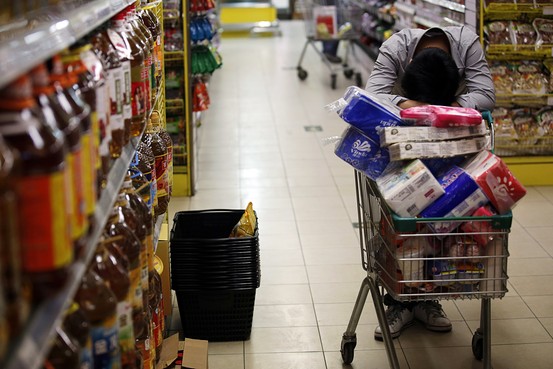Home -> News -> Media -> China a Growing Worry Among Fund Managers, BofA Survey Finds
China a Growing Worry Among Fund Managers, BofA Survey Finds

Global investors are increasingly worried about a sharp slowdown in China, which has eclipsed the U.S. Federal Reserve’s cutbacks in its bond-buying as the biggest perceived threat to the global economy, according to a survey of fund managers by Bank of America-Merrill Lynch.
Nearly half of those surveyed, or 46%, pointed to a hard landing for China’s economy, and an accompanying collapse in commodity prices, as the biggest risk. That’s up from up from 37% last month and 26% in December.
The bank polled 222 fund managers who manage a total of $591 billion of assets. Their biggest worries throughout much of the past year were political gridlock over the U.S. debt ceiling, followed by the Fed’s paring of its monthly asset purchases.
Still, the growing worry about China’s economy doesn’t amount to bearishness. In fact, many investors remain convinced that China is well-placed to shrug off any market turbulence and still has policy levers it can use.
Pieter van der Schaft, investment strategist for Asian fixed income at SchrodersSDR.LN -0.65%, said investors are “understandably” concerned about a hard landing, given the Chinese economy’s strong reliance on investment spending and credit. But a hard landing “is definitely not our base case,” he said.
Count Paul Chan, chief investment officer for Asia ex-Japan at Invesco, among those who are overweight Chinese equities. He noted that some have been predicting, incorrectly so far, a hard landing for China for two years now.
“A hard landing in 2014 for a country with the largest foreign-exchange reserves and the lowest government debt-to-GDP among major economies is highly unlikely,” he said. “Based on trade, capital flows and liquidity data, investors so far are willing to fund loan growth in China.”
Still, Société Générale and Morgan StanleyMS -2.03% are among banks to have advised clients on how best to hedge portfolios against the effects of a Chinese hard landing, amid trade and credit data for January that was greeted with skepticism and wariness about potential overheating, respectively.
“China is getting serious about deleveraging,” Société Générale said in a report this week. “This should make economic growth slower, but more balanced. There is a risk, however, that deleveraging gets out of control and leads to a hard landing, in which growth slows to 2% y/y at the trough.”
Some investors have been caught flat-footed by a sell-off in emerging markets since the start of the year. Goldman Sachs, for example, last month advised clients to close out one of its top five trade ideas for the year: a long position in the Hang Seng China Enterprise600675.SH -1.10% Index and a corresponding short position in copper futures for December delivery. That trade generated double-digit losses for anyone who followed the buy and sell recommendations at the times they were made.
The trade, recommended in early December with a profit projection of 25% based on “stable but not stellar” Chinese growth, would have resulted in “a potential loss of -13.5%,” Goldman said Tuesday.
Still, Goldman strategists remain overweight on China for the year ahead.
On the whole, investors’ “belief in global economic growth has moderated,” the BofA survey found, with a net 56% expecting the global economy to strengthen in year ahead, down from a net 75% last month.
Investors are cashing out of equity positions, taking their cash balances to 4.8% of portfolio value, the highest level since July 2012. “But regional data shows that concerns are focused on Global Emerging Markets (GEM), while optimism towards Europe and the U.S. remains strong,” the report said.
- .U.S. Treasury looks to hold more cash to deal with future crises
- .Yum, McDonald's in Shanghai food safety investigation
- .Yellen defends loose Fed policy, says job market still too weak
- .Carl Icahn says 'time to be cautious' on U.S. stocks
- .Samsung Electronics says second quarter profit likely down 24.5 percent; worst in two years
- .U.S. jobs data seen reinforcing strong growth outlook
- .Asia stocks up on buoyant Wall Street, oil near highs

